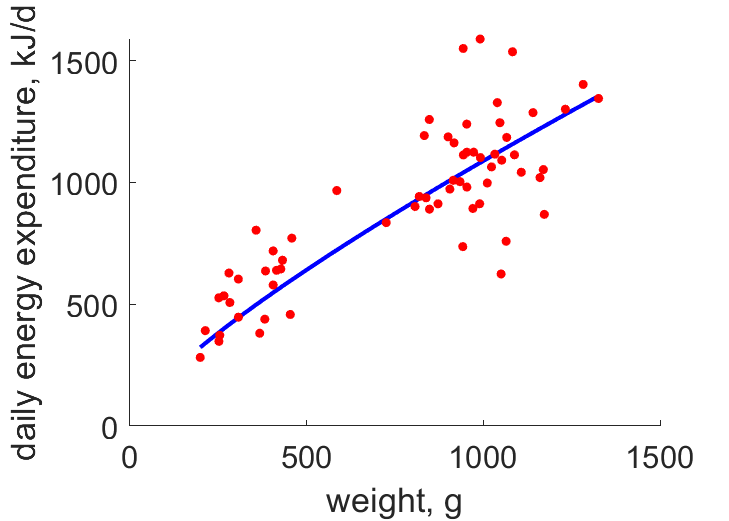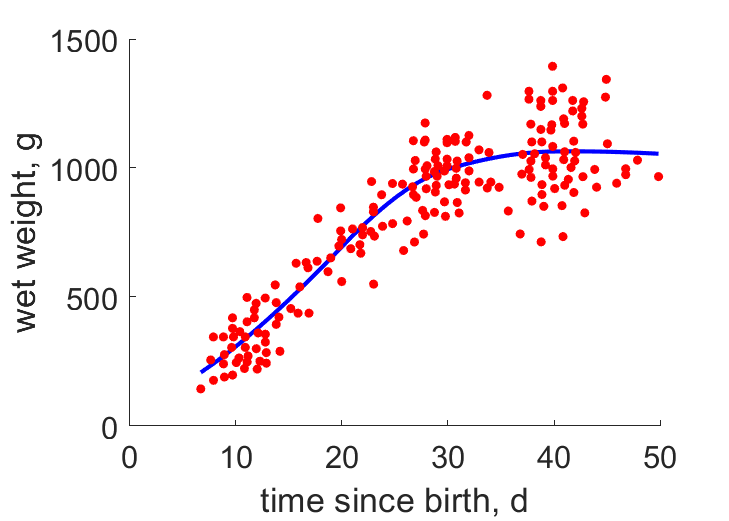Predictions & Data for this entry
| Model: std | climate: Dfb, Dfc | migrate: Ml | phylum: |
| COMPLETE = 3.0 | ecozone: TH | food: biCvf | class: |
| MRE = 0.115 | habitat: 0iFl, xiMc | gender: Dg | order: |
| SMSE = 0.063 | embryo: Tnsfm | reprod: O | family: |
Zero-variate data
| Data | Observed | Predicted | (RE) | Unit | Description | Reference |
|---|---|---|---|---|---|---|
| ab | 26 | 24.44 | (0.05983) | d | age at birth | RizzSchm2015 |
| tx | 49 | 48.9 | (0.001964) | d | time since birth at fledging | RizzSchm2015 |
| tp | 147 | 155.8 | (0.05966) | d | time since birth at puberty | guess |
| tR | 912.5 | 912.5 | ( 0) | d | time since birth at 1st brood | ADW |
| am | 8395 | 8416 | (0.002522) | d | life span | ADW |
| Wwb | 55 | 57.28 | (0.04138) | g | wet weight at birth | RizzSchm2015 |
| Wwi | 1614 | 1657 | (0.02636) | g | ultimate wet weight for female | RizzSchm2015 |
| Wwim | 1741 | 1740 | (0.0006229) | g | ultimate wet weight for male | RizzSchm2015 |
| Ri | 0.005479 | 0.005444 | (0.006555) | #/d | maximum reprod rate | RizzSchm2015 |
| pX25 | 1214 | 523.7 | (0.5686) | kJ/d | metab energy at 25 d | RizzSchm2015 |
| EXx | 58.6 | 33.86 | (0.4222) | MJ | cumulated food energy at fledging (25 d) | RizzSchm2015 |
Uni- and bivariate data
| Data | Figure | Independent variable | Dependent variable | (RE) | Reference |
|---|---|---|---|---|---|
| WpE |  | weight | daily energy expenditure | (0.1478) | RizzSchm2015 |
| tW |  | time since birth | wet weight | (0.1181) | RizzSchm2015 |
Pseudo-data at Tref = 20°C
| Data | Generalised animal | Gavia stellata | Unit | Description |
|---|---|---|---|---|
| v | 0.02 | 0.04516 | cm/d | energy conductance |
| p_M | 18 | 650.4 | J/d.cm^3 | vol-spec som maint |
| k_J | 0.002 | 0.02606 | 1/d | maturity maint rate coefficient |
| k | 0.3 | 0.2935 | - | maintenance ratio |
| kap | 0.8 | 0.963 | - | allocation fraction to soma |
| kap_G | 0.8 | 0.7998 | - | growth efficiency |
| kap_R | 0.95 | 0.95 | - | reproduction efficiency |
Discussion
- Males are assumed to differ from females by {p_Am} only
- The contribution of nitrogen waste in excreted energy is assumed to be small
- mod_1: v is reduced
- mod_2: Pseudo-data point k is used, rather than k_J; Data set tp and parameter t_R are added, the latter replacing clutch interval t_N. Postnatal T is based on PrinPres1991, see get_T_Aves. See further the revision page, theme puberty
Facts
- Breeds near small ponds, but food (fish) brought by parents comes from big lakes or coast upto 20 km away; fed till fledging (Ref: RizzSchm2015)
Acknowledgment
- The creation of this entry was supported by the Norwegian Science Council (NFR 255295)
Bibliography